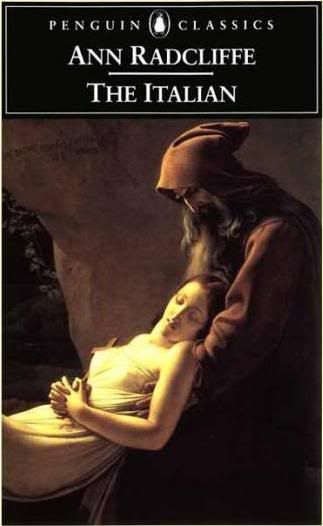Now that I've gotten that off my chest, I can focus on the book itself. You know, I had two basic impressions of Radcliffe from Austen's parody of her work in Northanger Abbey: Her books were pulpy and engaging, but overall she was a poor writer--the Dan Brown or Stephenie Meyer of her day. Both of these impressions are wrong. The Italian continuously impressed me by the quality of its language, but it fails to be engaging after the first few chapters.
Coming as I was from the rather stilted and laborious prose of Caleb Williams and Maria, Radcliffe's quick, capable prose was really refreshing. She has a particular knack for scene-setting--descriptions of towering mountain vistas, or obscure ruins, or shadowy dungeons--that supports her interest in 19th century ideas of the sublime, the idea that the soul can be enlarged and developed by the majesty of nature. Ellena, trapped in the nunnery with the help of the cruel Prioress (Catholics don't come off too well in this genre), is secretly given access by a friendly nun to a tower overlooking the tremendous beauty of the Italian landscape, which gives her the strength to go on. The passage I want to share here, however, is the one where Vivaldi is being carted off to Rome to face the Inquisition:
After quitting the Corso, it proceeded for some miles through dark and deserted streets, where only here and there a lamp, hung on high before the image of a saint, shed it's glimmering light, and where a melancholy and universal silence prevailed. At intervals, indeed, the moon, as the clouds passed away, shewed, for a moment, some of those mighty monuments of Rome's eternal name, those sacred ruins, those gigantic skeletons, which once enclosed a soul, whose energies governed a world!
I love this because 1.) I'm really fascinated by the fact that Rome, once the center of the Western world, had become nearly a ghost town for centuries, vacant except for the Holy See, and 2.) It's a good example of the kind of suspense and terror that Radcliffe tries, and only infrequently manages, to achieve.
Radcliffe believed that terror was also an agent of the sublime, and could enlarge the soul, but she contrasted it against horror, which was more explicit. Terror is only beneficial when it is ambiguous, predicated on the fear of the possible and not the shock or disgust of real violence. But this philosophy, at the extremes to which she takes it, is untenable. First of all, when there is no payoff for our apprehension, the threat diminishes. Like a 19th century Velma, Radcliffe loves to go back and explain away the sources of fear. We must know, for example, that the bloody surplice discovered in the ruined palace belonged to a character who had been shot with a stray bullet fired by a character we had forgotten about, and who was inserted just so that such an explanation can be dredged up later.
Secondly, Radcliffe has no conception that there are diminishing returns to this stuff. As if one scheming, shadowy monk wasn't enough, Radcliffe introduces a second one, and then in the final scenes where Vivaldi must go in front of the Inquisition, suddenly we're in a dark room filled with like twenty scheming, shadowy monks and it all seems a little ridiculous. Was it really necessary for Austen to parody this, when it does such a good job of parodying itself?
There are elements to The Italian that really work. The love story between Vivaldi and Ellena, devoted to each other across class barriers, is wonderfully compelling even though the characters themselves are thinly drawn. But I think that it's not a book one can love in the 21st century, when our bogeymen are made by Industrial Light and Magic.


3 comments:
I am so looking forward to spending some time with Radcliffe! I am taking a class with a PhD student who is obsessed with reviving and revisiting her work, so I hear quite a bit ABOUT her without having any knowledge of her at all - so thanks for the review!
This review makes Radcliffe sound like something I would really enjoy.
Brittany,
My next review is going to be about Matthew Lewis' The Monk, which is a really similar book that I enjoyed much more--for whatever that's worth.
Post a Comment